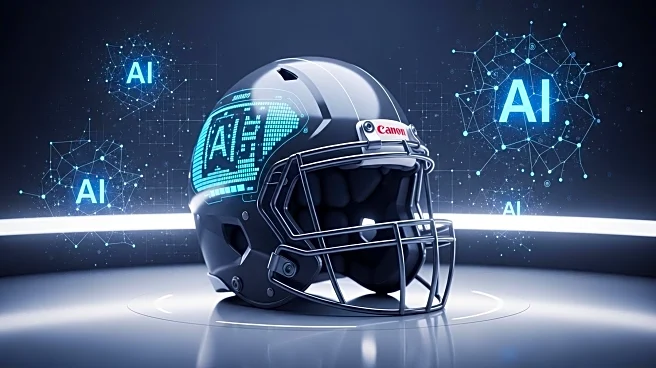What's Happening?
Artificial intelligence (AI) is increasingly being integrated into college football, transforming various aspects of the sport. AI is being used by recruiting assistants to streamline communication with players and synthesize scouting reports. It is also employed by sports insurance providers like Players Health to model athlete injury risks and offer insurance policies to schools. AI agents are utilized to gather information on players, aiding in decision-making during transfer portal windows. Additionally, companies like Hudl and Teamworks are developing AI-powered platforms to assist with game preparation and roster management. Despite its growing presence, AI's role in direct coaching decisions remains limited, with some coaches expressing skepticism about its current capabilities.
Why It's Important?
The integration of AI in college football signifies a shift towards data-driven decision-making, potentially enhancing team performance and player safety. AI tools can help teams identify talent more efficiently, manage risks associated with player injuries, and optimize business operations within athletic departments. This technological advancement could lead to more strategic recruitment and game planning, offering competitive advantages to programs that effectively leverage AI. However, the adoption of AI also raises questions about the balance between human intuition and machine-generated insights in sports management.
What's Next?
As AI technology continues to evolve, its application in college football is expected to expand. Schools may increasingly rely on AI for comprehensive player evaluations and strategic planning. Vendors are likely to enhance their AI offerings, making them more accessible and effective for athletic programs. The ongoing development of AI tools could lead to more sophisticated models for game strategy and player management. Stakeholders in college sports will need to navigate the ethical and practical implications of AI integration, ensuring that it complements rather than replaces human expertise.
Beyond the Headlines
The use of AI in college football could have broader implications for the sport's culture and operations. It may influence how teams approach recruitment, training, and game strategy, potentially altering traditional coaching methods. The reliance on AI could also impact the financial dynamics within college sports, as programs invest in technology to gain competitive edges. Additionally, the ethical considerations of AI in sports, such as data privacy and the potential for bias in decision-making, will require careful examination as its use becomes more prevalent.












